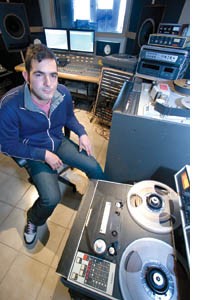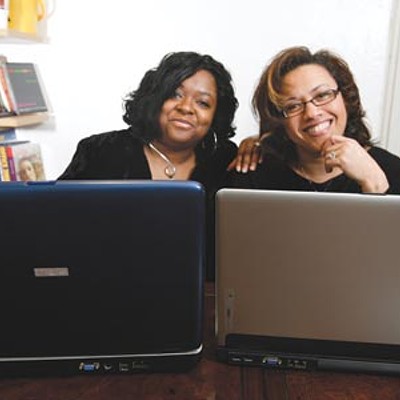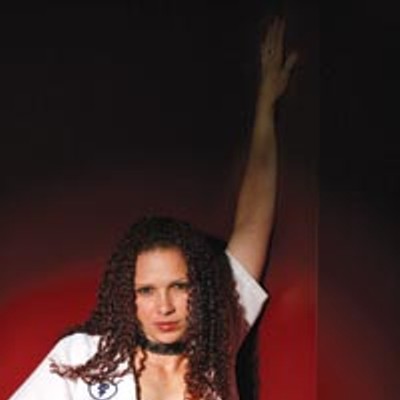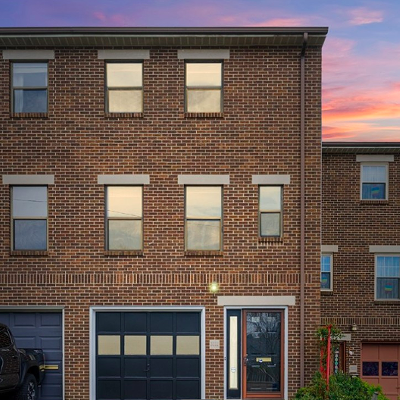There's quite a racket coming from Machine Age, but it's not The Resistors, the local rock group recording to the studio's vintage tape decks. Most of the noise is construction, as the walls go up for a separate hip-hop studio and vocal booth. Since 2004, the sound engineers -- Preslav Lefterov, Joe Bartoletta, Cary Belback and Shawn Rudiman -- have been building the communal studio themselves in an industrial space off Bigelow Boulevard. Preslav Lefterov took a break from the console -- and the tool bench -- to talk tape.
Why record to tape nowadays? Is it like how some people prefer vinyl?
It's very similar. Primarily, it's a personal preference -- a taste thing. There's a sonic advantage to doing at least part of your record in the analog format. We'll track a lot of stuff to tape first, and then transfer into a computer for editing.
Are these old tape machines temperamental?
They are. We were lucky to find a machine where the best technicians in the world for them are in Pennsylvania -- in York. We've befriended them, and one of the guys actually travels to Pittsburgh quite often. So we're lucky as far as that's concerned. Analog equipment in general could be a lot more of a problem [than digital], but it could be a lot more reliable, depending on the situation. It's not a computer -- it's just a machine. If it works, it works properly.
You're originally from Bulgaria?
My family moved when I was 14. My father started working for the University of Pittsburgh, and shortly after we came here, my mother started working for the university as well. My parents work in research, so that's how I ended up here. Basically, a move to find better opportunities all around for them, and that's what it's proven to be.
Opportunities for you?
I was on the pretty-determined track to go to medical school, so I went to Pitt in a program for neuroscience. When I finished college, I worked in a lab for about a year at the University of Pittsburgh. At that point, I'd already started the studio with my friend Joe Bartolotta, who is the other partner, and Cary Belback, who's another partner in the studio. I was working a full-time job and had to do sessions here, and had to do a lot of construction at first. It started to become a situation where I was investing a lot of money and time into the studio, but not enough to push it forward. So I decided to leave the university. I still work there part time in another department, but it's just a supplementary income.
I don't see the connection between neuroscience and owning a studio.
Everything started with DJing, when I was 18 ... and then I had a radio show at WRCT for two years. I started producing music as well, and started buying equipment. My senior year in college was when I started to consider it seriously; the catalyst was when I started to discuss it with Joe and Cary. Joe had just come back from a recording-engineer school in Florida.
But along the way, you had to become ... a carpenter?
Well, Shawn [Rudiman] had a lot more experience with construction than we did. But when we first started, we had to learn how to do everything. We made mistakes, and it took us longer than it would take a professional carpenter. But that's something I'm very glad I did. A self-improvement kind of thing.
You've recorded primarily indie rock lately.
We started primarily as a rock studio, but I come from a DJ background; I also worked in electronic music, and that's how I knew Shawn. We were trying to set up a studio that could be used by anyone, like a hip-hop client. Dan Dabber, he's a local reggae DJ, I'm finishing his new mix CD with him.
Is there any session you'd refuse?
Not really, to be quite honest. We haven't really had that problem. The only thing that we'd potentially turn down is a client who's not willing to abide [by] some basic rules, and we have very few.
What would someone have to do to be thrown out?
If a client was not prepared with their material and then had a problem with a large bill, for example. Time doesn't stop just because people aren't prepared for their recording session. Another thing would be to be destructive toward equipment. That's something we cannot afford to tolerate. Just respect for our time and our investment, what we've made. That's really it!















